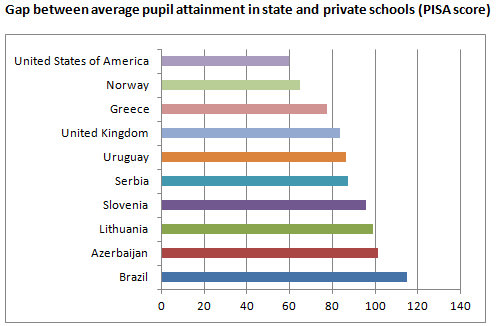How big is the state-private school attainment gap?
BBC 2 tonight screens a John Humphrys documentary — 'Unequal Opportunities' — which purports to look at the reasons for an apparent attainment gap persisting between rich and poor students in the UK.
Back in his day job on Radio 4's Today programme, Mr Humphrys this morning quizzed Education Secretary Michael Gove on how his Government plans to tackle the problem.
The claim
Mr Gove singled out the gap between pupils' academic achievements in state and private schools as a block to social mobility.
Join 72,953 people who trust us to check the facts
Sign up to get weekly updates on politics, immigration, health and more.
Subscribe to weekly email newsletters from Full Fact for updates on politics, immigration, health and more. Our fact checks are free to read but not to produce, so you will also get occasional emails about fundraising and other ways you can help. You can unsubscribe at any time. For more information about how we use your data see our Privacy Policy.
He said: "As a representative from the Sutton Trust, the social mobility charity, says on your [John Humphrys] own programme, the gap between private schools in this country and state schools is bigger than in any other country."
Analysis
Full Fact has been campaigning for politicians and commentators to make plain their sources when making such claims since its foundation, and it is refreshing to see Mr Gove taking heed in accrediting the Sutton Trust for the research.
But does this mean that his claim is legitimate?
We contacted the Sutton Trust, and their Research Director, Lee Elliot Major, added a few important caveats.
"We haven't actually published any research on this since 2004, but we have been tracking this gap internally since then, and the UK is still pretty near the top, although whether or not it is at the very top depends on your criteria," he told us.
In 2004 the Sutton Trust published a report compiled by Professor Alan Smithers of Liverpool University's Centre for Education and Employment which used the Organisation for Economic Co-Operation and Development's (OECD) Programme for International Student Assessment (PISA) findings. This did indeed find that Britain had the widest attainment gap of the nations surveyed.
However the fieldwork for this research was conducted in 2000, since when the OECD has twice updated its findings (in 2003 and 2006, with 2009 results currently under review).
So does such an assertion as "the gap between private schools in this country and state schools is bigger than in any other country" still hold water?
Looking at the findings from the 2006 PISA study, a mixed picture emerges. The average gap in achievement in science, mathematics and reading between those attending state and independent schools is indeed larger in Britain than in any of its allies in the OECD. Britain has a gap of 83 points on the PISA scale between state and private school pupils, a shade over the 77 point difference between the two in Greece.
However despite being an OECD publication, the PISA study actually encompasses nations beyond its 20 member states.
When these are included, the UK fares a little better by comparison, with Brazil, Azerbaijan, Lithuania, Slovenia, Serbia and Uruguay all having larger attainment gaps

According to Mr Elliot Major, it is important "to compare like with like, as what counts as an independent school can differ in some countries."
In particular, it is important to distinguish between countries where the majority of independent schools are academically selective and those where they are not. As Mr Elliot Major notes, "it has been shown that once the differences in social intakes at different types of schools are taken into account the gap shrinks markedly."
However there are a number of problems in making such distinctions.
Certain countries - including OECD nations France, the United States and Australia — have either returned incomplete data on the differences in attainment in the state and private education sectors, or have no data on that score at all.
Conclusion
Despite PISA's aim to create an internationally comparable benchmark for educational achievement, there remain a number of complexities in measuring the attainment gap between the state and private sectors.
And whilst there is some evidence to suggest that Britain may have the widest gap amongst OECD nations, the most up to date data available suggests that Michael Gove is overstating the case in saying that the UK has the largest gap in the world.
Full Fact has written to the Education Secretary to alert him to this important distinction.